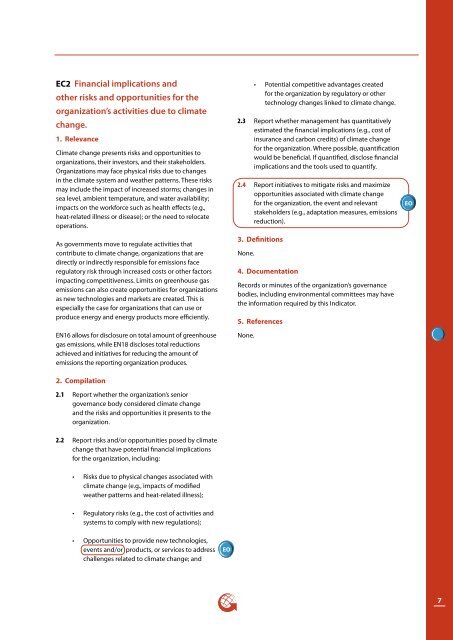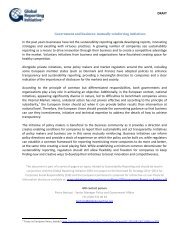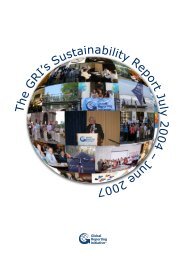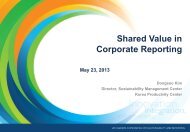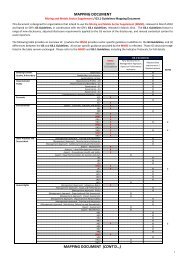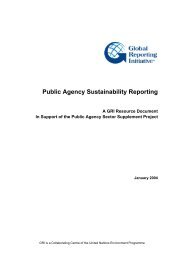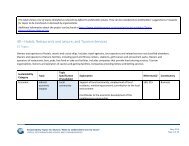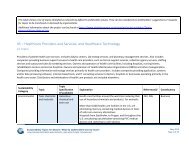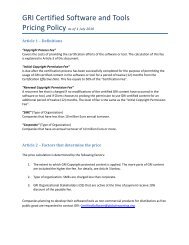Event Organizers Sector Supplement - Global Reporting Initiative
Event Organizers Sector Supplement - Global Reporting Initiative
Event Organizers Sector Supplement - Global Reporting Initiative
You also want an ePaper? Increase the reach of your titles
YUMPU automatically turns print PDFs into web optimized ePapers that Google loves.
EC2 Financial implications and<br />
other risks and opportunities for the<br />
organization’s activities due to climate<br />
change.<br />
1. Relevance<br />
Climate change presents risks and opportunities to<br />
organizations, their investors, and their stakeholders.<br />
Organizations may face physical risks due to changes<br />
in the climate system and weather patterns. These risks<br />
may include the impact of increased storms; changes in<br />
sea level, ambient temperature, and water availability;<br />
impacts on the workforce such as health effects (e.g.,<br />
heat-related illness or disease); or the need to relocate<br />
operations.<br />
As governments move to regulate activities that<br />
contribute to climate change, organizations that are<br />
directly or indirectly responsible for emissions face<br />
regulatory risk through increased costs or other factors<br />
impacting competitiveness. Limits on greenhouse gas<br />
emissions can also create opportunities for organizations<br />
as new technologies and markets are created. This is<br />
especially the case for organizations that can use or<br />
produce energy and energy products more efficiently.<br />
EN16 allows for disclosure on total amount of greenhouse<br />
gas emissions, while EN18 discloses total reductions<br />
achieved and initiatives for reducing the amount of<br />
emissions the reporting organization produces.<br />
• Potential competitive advantages created<br />
for the organization by regulatory or other<br />
technology changes linked to climate change.<br />
2.3 Report whether management has quantitatively<br />
estimated the financial implications (e.g., cost of<br />
insurance and carbon credits) of climate change<br />
for the organization. Where possible, quantification<br />
would be beneficial. If quantified, disclose financial<br />
implications and the tools used to quantify.<br />
2.4 Report initiatives to mitigate risks and maximize<br />
opportunities associated with climate change<br />
for the organization, the event and relevant<br />
stakeholders (e.g., adaptation measures, emissions<br />
reduction).<br />
3. Definitions<br />
None.<br />
4. Documentation<br />
Records or minutes of the organization’s governance<br />
bodies, including environmental committees may have<br />
the information required by this Indicator.<br />
5. References<br />
None.<br />
EO<br />
2. Compilation<br />
2.1 Report whether the organization’s senior<br />
governance body considered climate change<br />
and the risks and opportunities it presents to the<br />
organization.<br />
2.2 Report risks and/or opportunities posed by climate<br />
change that have potential financial implications<br />
for the organization, including:<br />
• Risks due to physical changes associated with<br />
climate change (e.g., impacts of modified<br />
weather patterns and heat-related illness);<br />
• Regulatory risks (e.g., the cost of activities and<br />
systems to comply with new regulations);<br />
• Opportunities to provide new technologies,<br />
events and/or products, or services to address<br />
challenges related to climate change; and<br />
EO<br />
7


